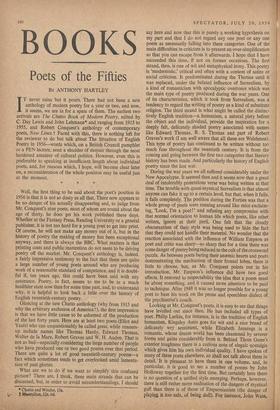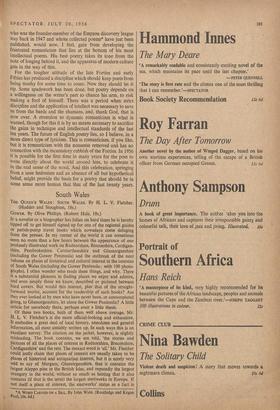Poets of the Fifties
BY ANTHONY HARTLEY IT never rains but it pours. There had not been a new anthology of modern poetry for a year or two, and now, it seems, we are in for a spate of them. The earliest two arrivals are The Chatto Book of Modern Poetry, edited by C. Day Lewis and John Lehmann* and ranging from 1915 to 1955, and Robert Conquest's anthology of contemporary poets, New Lines.t Faced with this, there is nothing left for the reviewer to do but talk about The Situation of English Poetry in 1956—words which, on a British Council pamphlet or a PEN lecture, send a shudder of despair through the most hardened amateur of cultural politics. However, even this is preferable to speaking at insufficient length about individual poets, and, for reasons which, I hope, will become clear later on, a reconsideration of the whole position may be useful just at the moment.
Well, the first thing to be said about the poet's position in 1956 is that it is not so dusty as all that. There now appears to be no danger of his actually disappearing and, to judge from Mr. Conquest's nine poets, most of whom are round about the age of thirty, he does get his work published these days. Whether at the Fantasy Press, Reading University or a general publisher, it is not too hard for a young poet to get into print. Of course, he will not make any money out of it, but in the history of poetry the making of money has been exceptional anyway, and there is always the BBC. What matters is that printing costs and public inattention do not seem to be driving poetry off the market. Mr. Conquest's anthology is, indeed, a fairly impressive testimony to the fact that there are quite a large number of young poets around who are producing work of a reasonable standard of competence, and it is doubt- ful if, ten years ago, this could have been said with any assurance. Poetry, in fact, seems to me to be in a much healthier state now than for some time past, and, to understand why, it is helpful to look back a little over the history of English twentieth-century poetry. say here and now that this is purely a working hypothesis on my part and that I do not regard any one poet or any one poem as necessarily falling into these categories. One of the main difficulties in criticism is to present an over-simplification so that you can escape from it afterwards. I hope that I have succeeded this time, if not on former occasions. The first strand, then, is one of wit and metaphysical irony. This poetry is 'modernistic,' critical and often with a content of satire or social criticism. It predominated during the Thirties until it was replaced, under the belated influence of Surrealism, by a kind of romanticism with apocalyptic overtones which was the main type of poetry produced during the war years. One of its characteristics, which it took from Surrealism, was a tendency to regard the writing of poetry as a kind of substitute religion. The third strand is what might be called the distinc- tively English tradition—a humanism, a natural piety before the object and the individual, provide the inspiration for a deeply felt, delicately shaded poetry associated with names like Edward Thomas, R. S. Thomas and part of Robert Graves's work (I am well aware that all these are Welshmen). This type of poetry has continued to be written without too much fuss throughout the twentieth century. It is from the coming and going between the first two categories that literary history has been made. And particularly the history of English poetry since the last war. During the war years we all suffered considerably under the New Apocalypse. It seemed then and it seems now that a great deal of intolerably pretentious verse was being written at that time. The trouble with quasi-mystical Surrealism is that almost anyone can fake it up to a certain level, but that, when it fails, it fails completely. The position during the Forties was that a whole group of poets were running around like mice exclaim- ing, 'Look, I'm a poet!' and refusing any compromise with that normal orientation to human life which poets, like other writers, ignore at their peril. One felt that the cloudy obscurantism of their style was being used to hide the fact that they could not handle their material. No wonder that the reaction associated with the influence of William Empson as poet and critic was sharp—so sharp that for a time there was some danger of poetry being reduced to the cult of the crossword puzzle. As between poets baring their anwmic hearts and poets demonstrating the mechanism of their frontal lobes, there is little to choose, but, as Mr. Conquest points out in his introduction, Mr. Empson's influence did have two good effects. It restored to respectability the idea that a poem must be about something, and it caused more attention to be paid to technique. After 1948 it was no longer possible for a young poet to base his work on the prone and speechless dialect of the psychiatrist's couch. who was the founder-member of the Empson discovery league way back in 1947 and whose collected poems* have just been published, would now, I feel, gain from developing the frustrated romanticism that lies at the bottom of his most intellectual poems. His best poetry takes its tone from the note of longing behind it, and the apparatus of modern culture gets in the way of this.
For the tougher attitude of the late Forties and early Fifties has produced a discipline which should keep poets from being mushy for some time to come. Now they should let it rip. Some spadework has been done, but poetry depends on a willingness on the writer's part to chance his arm, to risk making a fool of himself. There was a period when strict discipline and the application of intellect was necessary to save us from the bards and the shamans, and, thank God, that is now over. A reversion to dynamic romanticism is what is wanted, though for this it is by no means necessary to sacrifice the gains in technique and intellectual standards of the last ten years. The future of English poetry lies, so I believe, in a More direct type of lyricism. This is romanticism, if you like. but it is romanticism with the nonsense removed and has no connection with the incantatory rubbish of the Forties. In 1956 it is possible for the first time in many years for the poet to write directly about the world around him, to celebrate it in the real sense of the word. And this celebration, springing from a sane hedonism and an absence of all but hypothetical belief, might provide the basis for a poetry that should be in some sense more human that that of the last twenty years.



















































 Previous page
Previous page